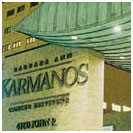
Voravit Ratanatharathorn, MD, has been named clinical director of the WSU Karmanos Cancer Institute's stem cell transplant program and leader of the bone-marrow transplant multidisciplinary team. He also will serve as WSU professor of internal medicine.
Dr. Voravit founded what is now the Karmanos bone-marrow transplant program in 1980; it now performs 150 transplants annually.
"The institute's BMT and stem-cell programs have grown exponentially since I was last here," Dr. Voravit said. "I look forward to enhancing the regional, national and international recognition of the institute's programs through the expansion of its outpatient BMT program, improving patient outcomes and building on its clinical and research base by incorporating innovative translational research. I am truly delighted to be back."
Dr. Voravit's interests include blood and marrow stem cell transplantation and the prevention and treatment of graft-vs.-host diseases well as graft-vs.-tumor effect. Dr. Voravit comes to the institute from the University of Michigan Medical Center, in Ann Arbor, where he served as professor of hematology and oncology.
Dr. Voravit earned both his undergraduate degree and medical degree from Mahidol University. He is board certified by the American Board of Medical Oncology, the American board of Hematology and the American Board of Internal Medicine.
Dr. Voravit is a member of several professional organizations, including the American College of Physicians, of which he is a fellow; the Southwest Oncology Group, where he is a member of its Bone-Marrow Transplant Committee; and the Transplant Society of Michigan, where he is a member of its Bone-Marrow Transplant Subcommittee.
The institute's BMT program has a state-of-the-art inpatient unit and stem-cell processing lab as well as an apheresis unit, day treatment unit, outpatient clinic and web-enabled data management unit. It has an active telemedicine program, and team members participate in weekly video conferencing with other transplant units throughout the United States.
The program is well funded and includes an immunotherapy laboratory, the minority-focused J.P. McCarthy Foundation Stem Cell Bank and Carls Foundation Stem Cell Processing Laboratory and the Center for Cellular Therapies dedicated to research in hematopoietic stem cells, dendritic cells and lymphocytes.